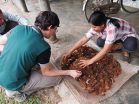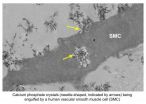(Press-News.org) Grand Challenges Canada, funded by the Government of Canada, today announces investments of $12 million in projects worldwide, aimed squarely at improving the health and saving the lives of mothers, newborns and children in developing countries.
From a "lucky iron fish" placed in tens of thousands of Asian cooking pots to reduce anemia, to "motherhood insurance" to ensure that poverty doesn't impede emergency care if needed during a baby's delivery, to kits for home farming edible insects to improve nutrition in slums of Africa and Latin America, the 65 imaginative projects focus on a range of health problems that, despite major progress, continue to kill millions of women, newborns and children each year.
Four Canadian-based projects (from Guelph, Toronto, Waterloo and Winnipeg) with proven impact and sustainability will share $2.6 million in scale-up grants and loans from Grand Challenges Canada, matched by $2.6 million from private and public partners, bringing total "transition-to-scale" investments to $5.2 million.
In addition, Grand Challenges Canada "Stars in Global Health" seed grants of $112,000 each ($6.8 million in total) are awarded to:
35 innovators from 13 developing countries in Asia, Africa and Latin America
26 Canadian-based innovators from the following cities: Vancouver (5 grants), Saskatoon (3 grants), Calgary, Victoria, Edmonton, Montreal, Toronto (2 grants each), Kamloops, Oakville, Oshawa, Ottawa, Waterloo, Sherbrooke, Laval, Sydney.
The announcement coincides with preparations in Toronto to host 'Saving Every Woman Every Child: Within Arm's Reach', a global summit on maternal, newborn and child health, being held from May 28 to 30. Organized by the Government of Canada, the Summit will assess progress on the Canadian-led "Muskoka Initiative" inaugurated at the G8 meeting in 2010. Canada has been a world leader in promoting the health and reducing mortality rates of women and children in developing countries.
To be implemented across 25 low- and middle-income countries, all of today's projects relate to the Summit goal of leveraging innovation. That also relates closely to one or more of the other critical issues at the heart of the Summit's agenda:
Accelerating progress on maternal health
Reducing newborn mortality
Saving lives through immunization
Scaling up nutrition as a foundation for healthy lives
Building civil registration and vital statistics systems
Building new partnerships with the private sector to leverage innovation and financing
Examples include:
The little "Lucky Iron Fish," now in growing use by cooks in Cambodia, has proven effective in reducing rampant iron deficiency among women – the cause of premature labour, hemorrhaging during childbirth and poor brain development among babies. Initial local reluctance to use a loose piece of iron in cooking pots was overcome by a clever design tapping into Cambodian folklore about a fish species that brings good fortune. In partnership with small businesses across Cambodia, plans for this year and next call for production and distribution of 60,000 lucky iron fish, made from recycled material at a cost of about $5 each, which provide health benefits for roughly three years. (Lucky Iron Fish, Guelph, a transition-to-scale investment, grant #0355, video, images. More information: http://bit.ly/1mIZeWr)
Innovative projects to improve survival of mothers and newborns include:
Revising neonatal intensive care methods in Guyana to save lives of infants in respiratory distress (Toronto Guyana Help The Kids Organization, a transition-to-scale investment, grant #0320, images)
A pessary (silicone ring) placed around the cervix of high-risk mothers during the 2nd trimester may help prevent prematurity. An estimated 15 million babies are born preterm every year and more than 1 million die from preterm birth complications. Many others are facing life-long disabilities or health complications. This project will adapt and validate the technique's use in resource-low countries. (Centre Hospitalier, Université de Sherbrooke, seed grant #0473, video)
A low cost "safe motherhood insurance program" being started in the Philippines to overcome financial barriers that often delay poor women from getting appropriate care in labour. Working with insurance companies, the project represents a novel potential business model to further reduce the rate of maternal mortality worldwide. (Philippine Business for Social Progress, seed grant #0545, video , images)
Several innovative projects (13) designed to improve the health and survival of women, newborns and children through better nutrition include:
Fortifying fish sauce in Cambodia with thiamin to raise levels in mother's milk and prevent infantile beriberi (University of British Columbia, seed grant #0490, video)
Fortifying dal in Bangladesh with iron to reduce diarrhea, measles, malaria and pneumonia (University of Saskatchewan, seed grant #0495, video, images)
Novel farming technologies to provide high protein edible insects and address food insecurity in slums in Ghana, Kenya and Mexico (McGill University, Montreal, seed grant #0479, video, images)
Some 16 projects seek to advance health and reduce mortality rate through improved water and sanitation, including:
A new marketing strategy to reduce open defecation and the use of toilets in rural Nepal (iDE, Winnipeg, a transition-to-scale investment, grant #0354, images)
A safe new human waste disposal system for humanitarian emergencies (Université Laval, seed grant #0484, video)
Projects to combat malaria (seven in all), include:
E-coupons delivered via mobile phones offering subsidized bednets to target populations in Tanzania (Mennonite Economic Development Associates and Queen's University, Waterloo, Ontario, a transition-to-scale investment, grant #0321, images)
A simple way to lure, trap and kill malarial mosquitos with a deadly fruit meal in a device easy to make at home from plastic drink bottles. Manufacture of the traps creates a potential village income opportunity. (Ifakara Health Institute, Tanzania, seed grant #0555, video)
Projects addressing childhood illness include:
Engaging unlicensed drug shops in Uganda, which serve 60% of the nation's rural population, to accurately recognize and treat childhood illness (University of Calgary, seed grant #0492, video, images)
A fingerprick blood biomarker to replace chest x-rays for pneumonia diagnosis (University of Alberta, Edmonton, seed grant #0486, video)
Improving the survival rate of infants in Uganda after hospital discharge, including a mobile phone app to help identify babies at highest risk of dying and a Post Discharge Survival Kit for families (University of British Columbia, seed grant #0489, video, images)
All projects, listed geographically:
Asia: 26 projects, total investment: $5.7 million: http://bit.ly/1sbmOIu
Africa: 31 projects, total investment: $4.86 million: http://bit.ly/RxudX1
Latin America / Caribbean: 8 projects, total investment: $1.4 million: http://bit.ly/1mKMXMw
All Canadian-based projects: 30 projects, including four transition to scale investments: http://bit.ly/1mIZeWr
All projects listed by health priority: http://bit.ly/1oeOZIV
"Our government is proud of the progress on promises Canada and other nations made as part of the Muskoka Initiative to improve the health and save the lives of women, newborns and children in the developing world," said the Honourable Christian Paradis, Minister of International Development and Minister for La Francophonie. "By supporting innovative proof-of-concept projects and the scale-up of proven ideas, and by leveraging additional private sector knowledge and funds, a difference is being felt in health conditions in developing countries. The creation of jobs here and abroad serves as an added benefit."
Dr. Peter A. Singer, Chief Executive Officer at Grand Challenges Canada notes that, Grand Challenges Canada selects projects that embody the "Integrated Innovation" approach – the combination of science and technology with social and business innovation to find sustainable solutions to health challenges.
"All of the projects announced today illustrate the power of innovation to save and improve the lives of women and children," says Dr. Singer. "Innovation really means that tomorrow will be a brighter day than today for those who need it the most in developing nations. I salute the global leadership Canada is showing in focusing the world's attention on saving every women and every child."
INFORMATION:
About Grand Challenges Canada
Grand Challenges Canada is dedicated to supporting Bold Ideas with Big Impact in global health. We are funded by the Government of Canada and we support innovators in low- and middle-income countries and Canada. The bold ideas we support integrate science and technology, social and business innovation to find sustainable solutions to health challenges – we call this Integrated Innovation®. Grand Challenges Canada focuses on innovator-defined challenges through its Stars in Global Health program and on targeted challenges in its Saving Lives at Birth, Saving Brains and Global Mental Health programs. Grand Challenges Canada works closely with Canada's International Development Research Centre (IDRC), the Canadian Institutes of Health Research (CIHR) and the Department of Foreign Affairs, Trade and Development Canada (DFATD) to catalyze scale, sustainability and impact. We have a determined focus on results, and on saving and improving lives.
http://www.grandchallenges.ca
Canada funds 65 innovative health projects to help save every woman, every child
New investments top $12 million: 4 scale-up projects plus 61 seed grants announced as Canada prepares to host world summit on maternal, newborn and child health, May 28-30
2014-05-22
ELSE PRESS RELEASES FROM THIS DATE:
New insights into premature ejaculation could lead to better diagnosis and treatment
2014-05-22
There are many misconceptions and unknowns about premature ejaculation in the medical community and the general population. Two papers, both being published simultaneously in Sexual Medicine and the Journal of Sexual Medicine, provide much-needed answers that could lead to improved diagnosis and treatment for affected men.
Premature ejaculation can cause significant personal and interpersonal distress to a man and his partner. While it has been recognized as a syndrome for well over 100 years, the clinical definition of premature ejaculation has been vague, ambiguous, ...
Could cannabis curb seizures? Experts weed through the evidence
2014-05-22
The therapeutic potential of medical marijuana and pure cannabidiol (CBD), an active substance in the cannabis plant, for neurologic conditions is highly debated. A series of articles published in Epilepsia, a journal of the International League Against Epilepsy (ILAE), examine the potential use of medical marijuana and CBD in treating severe forms of epilepsy such as Dravet syndrome.
In a case study, Dr. Edward Maa, Chief of the Comprehensive Epilepsy Program at Denver Health in Denver, Colo., details one mother's experience of providing medical marijuana to her child ...
Scientists announce top 10 new species for 2014
2014-05-22
SYRACUSE, N.Y. — An appealing carnivorous mammal, a 12-meter-tall tree that has been hiding in plain sight and a sea anemone that lives under an Antarctic glacier are among the species identified by the SUNY College of Environmental Science and Forestry's (ESF) International Institute for Species Exploration (IISE) as the top 10 species discovered last year.
An international committee of taxonomists and related experts selected the top 10 from among the approximately 18,000 new species named during the previous year and released the list May 22 to coincide with the birthday, ...
Temperature influences gender of offspring
2014-05-22
Whether an insect will have a male or female offspring depends on the weather, according to a study led by Joffrey Moiroux and Jacques Brodeur of the University of Montreal's Department of Biological Sciences. The research involved experimenting with a species of oophagous parasitoid (Trichogramma euproctidis), an insect that lays its eggs inside a host insect that will be consumed by the future larvae. "We know that climate affects the reproductive behaviour of insects. But we never clearly demonstrated the effects of climate change on sex allocation in parasitoids," Moiroux ...
Decision to jettison end of life Liverpool Care Pathway 'too extreme'
2014-05-22
The decision to jettison the approach to care of the dying, known as the Liverpool Care Pathway (LCP), was "too extreme," given that its principles are widely regarded as among the best examples of palliative care in the world, argues a senior ethicist in the Journal of Medical Ethics.
The LCP, which was intended to transfer the principles of hospice care to hospitals, fell foul of poor application by healthcare professionals and widespread misunderstanding of its scope and purpose among the general public, argues Dr Anthony Wrigley of the Centre for Professional Ethics ...
Improved GP access in standard hours may trump extended opening times
2014-05-22
Improving family doctor access during standard working hours might be better for reducing out of hours service use than extending the opening times of GP surgeries, suggests research published online in Emergency Medicine Journal.
If the link between access and out of hours service use is causal, this approach could cut demand for the latter by a maximum of 11%, the findings indicate.
Difficulties getting to see a GP when needed have been blamed for fuelling the rise in demand for out-of-hours primary care services, including emergency care. But there is not much evidence ...
Training brain patterns of empathy using functional brain imaging
2014-05-22
An unprecedented research conducted by a group of neuroscientists has demonstrated for the first time that it is possible to train brain patterns associated with empathic feelings – more specifically, tenderness. The research showed that volunteers who received neurofeedback about their own brain activity patterns whilst being scanned inside a functional magnetic resonance (fMRI) machine were able to change brain network function of areas related to tenderness and affection felt toward loved ones. These significant findings could open new possibilities for treatment of ...
Protective proteins reduce damage to blood vessels
2014-05-22
Researchers have uncovered how proteins found in our blood can reduce damage caused to blood vessels as we age, and in conditions such as atherosclerosis and arthritis.
Calcification is a major risk factor for heart attack and stroke. Blood vessels can harden as calcium phosphate (CaP) crystals, normally found in bones and teeth, build up in soft tissue as we age or as a result of illness. This can lead to complications in patients with atherosclerosis, a major cause of death in the UK whereby arteries thicken and are at risk of becoming blocked.
However a team of scientists ...
Disruption of circadian rhythms may contribute to inflammatory disease
2014-05-22
A disruption of circadian rhythms, when combined with a high-fat, high-sugar diet, may contribute to inflammatory bowel disease and other harmful conditions, according to a recent study conducted by researchers at Rush University Medical Center. The study is online at the peer-reviewed, open-access journal, PLOS ONE.
"Circadian rhythms, which impose a 24-hour cycle on our bodies, are different from sleep patterns," said Robin M. Voigt, PhD, assistant professor at Rush Medical College and first author of the study. "Sleep is a consequence of circadian rhythms," Voigt said.
While ...
Surgical site infections associated with excess costs at Veterans Affairs hospitals
2014-05-21
Surgical site infections (SSIs) acquired by patients in Veterans Affairs (VA) hospitals are associated with costs nearly twice as high compared to patients who do not have this complication. The greatest SSI-related costs are among patients undergoing neurosurgery.
SSIs are associated with increased complications and death. Treatment can include long courses of antibiotics, physical therapy, hospital readmissions and reoperations. Costs associated with SSIs after surgery have been under scrutiny since the Centers for Medicare and Medicaid stopped paying for increased ...
LAST 30 PRESS RELEASES:
Fossil amber reveals the secret lives of Cretaceous ants
Predicting extreme rainfall through novel spatial modeling
The Lancet: First-ever in-utero stem cell therapy for fetal spina bifida repair is safe, study finds
Nanoplastics can interact with Salmonella to affect food safety, study shows
Eric Moore, M.D., elected to Mayo Clinic Board of Trustees
NYU named “research powerhouse” in new analysis
New polymer materials may offer breakthrough solution for hard-to-remove PFAS in water
Biochar can either curb or boost greenhouse gas emissions depending on soil conditions, new study finds
Nanobiochar emerges as a next generation solution for cleaner water, healthier soils, and resilient ecosystems
Study finds more parents saying ‘No’ to vitamin K, putting babies’ brains at risk
Scientists develop new gut health measure that tracks disease
Rice gene discovery could cut fertiliser use while protecting yields
Jumping ‘DNA parasites’ linked to early stages of tumour formation
Ultra-sensitive CAR T cells provide potential strategy to treat solid tumors
Early Neanderthal-Human interbreeding was strongly sex biased
North American bird declines are widespread and accelerating in agricultural hotspots
Researchers recommend strategies for improved genetic privacy legislation
How birds achieve sweet success
More sensitive cell therapy may be a HIT against solid cancers
Scientists map how aging reshapes cells across the entire mammalian body
Hotspots of accelerated bird decline linked to agricultural activity
How ancient attraction shaped the human genome
NJIT faculty named Senior Members of the National Academy of Inventors
App aids substance use recovery in vulnerable populations
College students nationwide received lifesaving education on sudden cardiac death
Oak Ridge National Laboratory launches the Next-Generation Data Centers Institute
Improved short-term sea level change predictions with better AI training
UAlbany researchers develop new laser technique to test mRNA-based therapeutics
New water-treatment system removes nitrogen, phosphorus from farm tile drainage
Major Canadian study finds strong link between cannabis, anxiety and depression
[Press-News.org] Canada funds 65 innovative health projects to help save every woman, every childNew investments top $12 million: 4 scale-up projects plus 61 seed grants announced as Canada prepares to host world summit on maternal, newborn and child health, May 28-30


